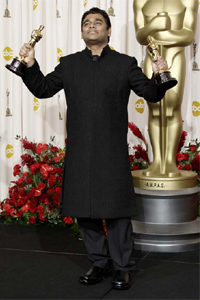 Excerpts
from an interview:
Q: It's heartening to see you representing
India at the British Academy of Film and Television Arts (BAFTA)
and Golden Globes.
A: Thanks. I had no idea I'd win. See, each
member of the jury had his or her opinion. It was a very international
jury. I think they've been very kind to the music of "Slumdog
Millionaire". I just heard that after Golden Globes the
music has gone to No.1 in the US charts. That's great news.
Q: How has the Golden Globe changed
your life?
A: Everyone from Andrew Lloyd Webber to Danny
Elfman, Craig Armstrong, who worked with me on "Elizabeth:
The Golden Age", got in touch. Now I feel a lot more freedom
beyond film music, as a musician. I can do my own thing now,
things that I wanted to do. Hip-hop artist Akon wants me to
write something. He wanted me to do a music video with him.
But I want to compose or write, not be in his video.
Q: You looked very shy collecting your
awards.
A: In that one week, I received three awards
in the US. The first was the Critics' Awards. When I got that,
the American media wasn't interested in me. They didn't want
my solo photographs. 'Can you please stand next to Danny Boyle?'
they'd say. I think it was a glamour thing. By the time I came
to the third award, the Golden Globe, they said, 'Can we have
your solo pictures, please?'
Q: Did you see a discernible change
in the way people looked at your music?
A: Yes. I remember when my "Roja"
happened, there was a genuine smile on people's faces. I sensed
a dej?u with "Slumdog Millionaire". Steven Spielberg,
Martin Scorcese, Sting - they all said they loved the film and
music. And they meant it. It was a great change for them. Change
is always welcome.
Q: Would you say "Slumdog Millionaire"
is the most successful Indian music score outside India?
A: It's not an Indian score, because it's not
an Indian film. But it certainly doesn't sell Indian poverty
to the West. I know a lot of people are saying that. But I don't
agree. If I thought that for even a second, I wouldn't have
done it. There are so many films that I've refused to do because
I objected to them on ethical, moral or other grounds. I'm so
finicky about these things.
As I see it, "Slumdog Millionaire"
clearly says India is developing fast and is no longer a third-world
country. And why should we hide our darker side? The world is
no more about the haves and have-nots. It's a global community.
We need to know about one another. In fact, the A.R. Rahman
Foundation is working towards eradicating poverty. And we need
global cooperation for that.
Q: Has "Slumdog Millionaire"
contributed to your Foundation?
A: I think the very fact that it's made my
way into the West and Hollywood easier is contribution enough.
The film has generated a lot of interest in my music and Hindi
music.
Q: Why was there so much secrecy while
you were working on the score for "Slumdog Millionaire"?
A: I was working with Danny Boyle for the first
time. I wasn't sure I wanted to work with him. I wasn't sure
of the sound. When two new people work with each other the output
can go either way. Fortunately, it worked. The main composition
and mixing was done in 20 days. I had no choice but to work
fast. See, when you're doing something new it's much easier
to speed the process. It's when you are asked to bring in a
variation in the same format that you need more time.
Q: The West may be enamoured of your
Bollywood packaging in "Slumdog Millionaire". But
we've heard a lot better from even as recently as in 2008.
A: See, that's a matter of opinion. A music
score has to suit the theme and content. I've tried to match
the mood of the film. The music is designed for "Slumdog
Millionaire". I'm very proud of my music in "Slumdog
Millionaire". I was given just about 20 days to do the
score. Likewise, I got just about 20 days to do the background
music of "Ghajini". I virtually had to work at the
speed of sound. That, in spite of the fact that we lost the
sound engineer and 26/11 happened. So I'm learning the virtues
of speed finally.
|

